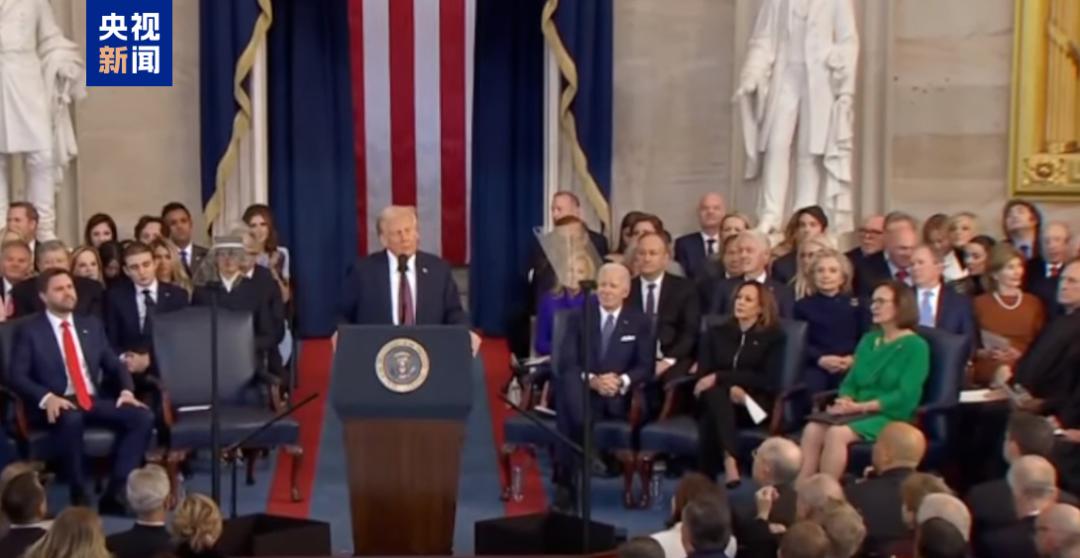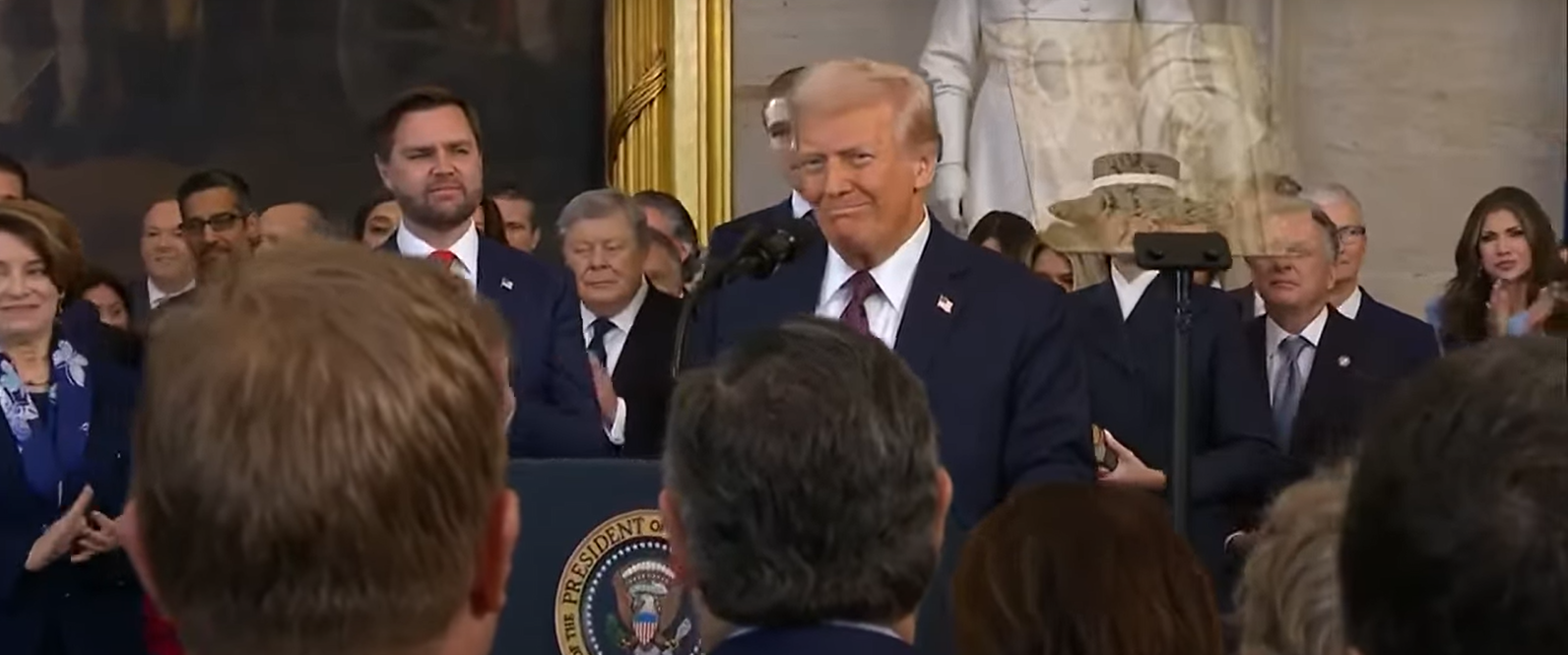On January 20th, local time, the cold wind was blowing in Washington D.C., but the political fervor in the United States was unprecedentedly high. Donald Trump took the oath of office as the 47th President of the United States in the Rotunda of the Capitol. This historic moment attracted the attention of the world, acting like the center of a political storm, stirring up the political landscape of the United States and even the world.

Grand Ceremony: The Solemn Transfer of Power
On that day, Washington D.C. was under tight security, resembling a heavily fortified fortress. Roads were closed, subway entrances were shut down, and a 48-kilometer-long fence surrounded the core area of the inauguration ceremony. Many of Trump's supporters, dressed in clothing emblazoned with campaign symbols, came from all over. Their eyes sparkled with anticipation and enthusiasm. Politicians, business tycoons, and media representatives also gathered. Tech magnates such as Elon Musk, the CEO of Tesla, Jeff Bezos, the founder of Amazon, and Mark Zuckerberg, the CEO of Meta, were also present at the ceremony.
Presided over by John Roberts, the Chief Justice of the Supreme Court of the United States, Trump solemnly recited the oath of office. Every syllable seemed to announce his return and determination to the world. Subsequently, the elected Vice - President, Vance, also took the oath.
Policy Blueprint: A New Plan for America's Direction
Domestic Economic Policies
Tax Cuts and Regulatory Relaxation
Trump firmly believes that large - scale tax cuts and regulatory relaxation are the "magic keys" to economic growth. He plans to further reduce corporate income tax, attempting to make businesses stay in the United States as if they were homing birds, stimulating their innovation and expansion vitality.
Infrastructure Construction
Trump promised to increase investment in infrastructure, building highways, bridges, and airports. He hopes to create a huge number of job opportunities through this. From construction workers to engineers, from raw material suppliers to transportation practitioners, everyone can find opportunities in this construction wave, thus improving the living standards of the people and making the engine of the US economy roar again.
In his inaugural speech, Trump declared a national energy emergency, aiming to increase the exploitation of traditional energy, end the Biden administration's "Green New Deal", revoke preferential policies for electric vehicles to save the US traditional automotive industry, refill the strategic reserve, and export US energy to countries around the world.
Immigration Policies
Strengthened Border Control
Trump vows to restart the construction of the US - Mexico border wall. He regards illegal immigrants as a "menace" to American society, believing that they have snatched job opportunities from native residents and may bring security problems such as crime. There are plans to carry out a large - scale immigration raid in Chicago, the first step of the "largest - scale deportation operation in US history", and he may even declare a national emergency and use the military to forcibly repatriate illegal immigrants.
Abolition of Birthright Citizenship
Trump also intends to abolish the "birthright citizenship" in the United States. However, this measure faces complex legal procedures such as amending the constitutional amendment.
Foreign Policies
Adjustment of NATO Relations
Trump's attitude towards NATO remains tough. He believes that the United States has borne too much of the defense spending in NATO. In the future, he may more resolutely demand that European allies increase their defense spending to reach the target of 2% of their GDP. This will undoubtedly bring new variables to US - European relations.
International Trade Protection
Trump has always adhered to trade protectionism in his foreign policy, and his initiatives regarding the establishment of the "External Revenue Service" and his stance on the North American Free Trade Agreement (NAFTA) have attracted much attention.
Trump has claimed that he will establish an "External Revenue Service" with the aim of imposing additional tariffs on foreign imported products. He believes that the US market is flooded with a large number of low-cost imported goods, which have severely impacted domestic industries. For example, due to their low costs, a large number of Chinese photovoltaic products have entered the United States, putting domestic photovoltaic enterprises in the US in a survival crisis, with decreasing orders and continuous layoffs. Trump hopes that by imposing additional tariffs, the prices of imported products can be increased, forcing consumers to prefer domestic goods and helping domestic industries recover.
Trump has always been dissatisfied with NAFTA. Since the agreement took effect in 1994, trade between the United States, Canada and Mexico has become freer, but he believes that this has led to the loss of manufacturing jobs in the United States. Many American enterprises have moved their factories to Mexico to reduce costs. In the textile industry, for example, a large number of jobs have been transferred accordingly. Meanwhile, the US trade deficit with Canada and Mexico has expanded, and there is an imbalance in the import and export of agricultural and manufacturing products. Therefore, Trump is likely to renegotiate NAFTA, demanding adjustments to clauses such as market access and labor standards. If the negotiations fail, he is highly likely to withdraw, which will greatly affect the trade pattern in North America and even globally.
Adjustment of Middle East Policies
Trump may withdraw troops from some military conflicts in the Middle East, reducing overseas military intervention, but he will also take a tough stance against terrorist threats to ensure the core interests of the United States in the Middle East, such as the stable supply of oil resources. In addition, in his inaugural speech, he declared that he would take back control of the Panama Canal, which has drawn strong opposition from the Panamanian government.

Mounting Challenges: Thorns on the Road Ahead
Domestic Political Divisions
Intensified Bipartisan Conflicts
The Democratic Party is hostile to Trump's policies. Regarding immigration policies, the Democratic Party accuses Trump's tough measures of violating the spirit of humanism and harming the multicultural society of the United States. In terms of healthcare reform, Trump advocates repealing the Obamacare Act, while the Democratic Party defends it with all its might. The serious differences between the two parties may lead to a deadlock in Congress on related issues.
Clashes of Social Concepts
Policies such as Trump's announcement that the US government will only recognize two genders, male and female, run counter to the ideas of some groups in American society that pursue diversity and inclusion, which may trigger disputes and conflicts at the social level.
International Pressures
Tense Relations with Allies
American allies are full of concerns and uncertainties about Trump's policies. His trade protectionism and tough attitude towards NATO may make European allies dissatisfied, thus affecting US - European relations.
Hindrance to International Cooperation
In addressing global issues such as climate change and global public health, Trump's isolationist tendencies may cause rifts in the cooperation between the United States and the international community. For example, on the first day of his taking office, he signed an executive order for the US to withdraw from the Paris Agreement, a decision widely criticized by the international community.
Trump's assumption of office is a major turning point in American politics. Whether he can lead the United States to "make America great again" is the expectation of the American people and the focus of global attention. Where will the United States head in the next four years? Let's wait and see.
Post time: Jan-21-2025






